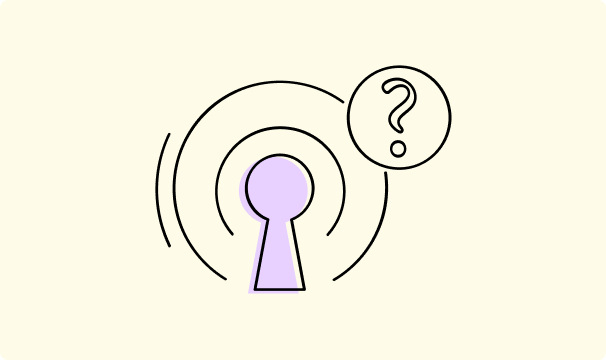What is OpenVPN: A Comprehensive Guide to Its Functions and Benefits
Key takeaways:
- OpenVPN uses AES-256 encryption, SSL/TLS authentication, and flexible tunneling protocols like OpenVPN UDP and TCP to ensure secure, private, and reliable VPN connections.
- OpenVPN works on all major platforms, including Windows, macOS, Linux, iOS, and Android.
- As open-source software, OpenVPN’s code is publicly available which allows people to see how it works and verify its security.
On the internet, risks could be lurking behind any step you take, from hackers who want to steal your data to surveillance that follows everything you do. This is why using a virtual private network (VPN) is more important than ever.
If you wouldn’t leave your house without locking the door, you also shouldn’t take your devices’ security for granted. But how do you choose the right virtual private network for you, as there are so many options out there?
OpenVPN is an open-source VPN protocol that provides you with secure and flexible internet access. On top of that, the OpenVPN protocol is one of the most reliable options for creating a secure tunnel between your device and the internet.
If you want to take full control of your online privacy and leverage safe VPN connections, it’s imperative that you understand OpenVPN and how it works. In this article, we will cover everything you need to know.

Adomas Šulcas
4 min read

What is OpenVPN?
OpenVPN is open-source software that works like a security guard for your internet access. When you connect to a VPN server, it wraps your data in advanced encryption.
This VPN protocol uses special tunneling protocols that allow you to build a safe VPN tunnel between your device and the internet. It supports advanced encryption methods, like AES-256 or ChaCha20, both of which are military-grade levels of encryption.
Also, you can choose between OpenVPN UDP or OpenVPN TCP protocols for data transmission. However, it’s usually recommended to use the UDP port since it's faster. All in all, these features make the OpenVPN protocol a top pick for both personal and enterprise use.
Why Use OpenVPN?
A lot of people use OpenVPN every day for several reasons. Here’s what makes this virtual private network so popular.
Security
The OpenVPN protocol uses top-level protection to keep you safe. It locks your data with AES-256 or one of the other ciphers that meet the strongest security standards. When you add TLS checks, your VPN connections stay secure from anyone trying to spy or steal your data.
Flexibility
You can use OpenVPN on any device that you own. This VPN protocol works with Windows, macOS, Linux, iOS, and Android. Setting up the VPN client to connect to an OpenVPN server is easy, no matter what device you have, making it perfect for phones, computers, and tablets alike.
Reliability
OpenVPN helps you get past firewalls and other restrictions that limit or block internet usage. It lets you pick between OpenVPN UDP when you need more speed and OpenVPN TCP when you need stable connections. Therefore, OpenVPN works well even when internet usage is censored.
Open-Source Trust
Since OpenVPN is open-source software, anyone can look at how the underlying code of a virtual private network works. The code is accessible to absolutely anyone and, if you want to, you can review and verify its effectiveness. That way, tech-savvy users can trust it more because they know there are no hidden traps or vulnerable weak spots.
OpenVPN Features and Benefits
Encryption Standards
The OpenVPN protocol relies on cutting-edge encryption methods like AES-256, SSL/TLS, and the OpenSSL library. These make it nearly impossible for anyone to intercept or decode your data.
Customizability
Any virtual private network under OpenVPN is highly customizable, regardless if you are a personal user setting up a secure home network or a business creating a private VPN tunnel. You can configure your VPN client and OpenVPN servers to meet your exact needs.
Cross-Platform Support
OpenVPN is supported on almost every platform, from Windows to macOS to both Android and iOS mobile devices. Its ability to connect seamlessly to various VPN servers benefits businesses and personal users alike.
How to Use OpenVPN?
Getting started with OpenVPN is easier than you may think:
- Download and install the OpenVPN software from the official website.
- Get your “.ovpn” configuration files, which include details about your VPN server and how to connect.
- Import the configuration file into your OpenVPN app or VPN client.
- Connect to your chosen OpenVPN server and enjoy secure, private browsing.
If you’re struggling with the installation, you can find more detailed information in the community resources of the official OpenVPN page.
For more advanced configurations, like customizing your VPN tunnels, you can explore the OpenVPN Community Edition for even more control.
OpenVPN Use Cases
Personal Use
OpenVPN is perfect for personal users who want to feel more secure while doing their regular online activities. Here’s what you can do with it:
- Browse safely on public Wi-Fi by using a VPN tunnel to protect your data.
- Access geo-restricted content, like streaming platforms and locked movies, by connecting to a VPN server in another region.
Bypassing Censorship
If you’re in a country that imposes heavy internet restriction or censorship, OpenVPN can help. Its OpenVPN protocol allows you to bypass censorship by creating a secure tunnel through firewalls and other blocks.
Final Words
This VPN protocol is a reliable tool for protecting your online privacy. OpenVPN has strong encryption, open-source transparency, and cross-platform support that places it among one of the best solutions for creating secure VPN connections.
If you’re looking to secure your data in public places, bypass censorship, or create a private VPN tunnel, OpenVPN is a trusted option you can use. Explore VPN services, like CometVPN, that use this VPN protocol today and experience a safer internet with no performance issues.
Frequently Asked Questions
What makes OpenVPN secure?
OpenVPN uses advanced encryption methods such as AES-256 and SSL/TLS which makes sure that your VPN connections are protected from unauthorized access and prying eyes.
Is OpenVPN free to use?
Yes, OpenVPN has a free version through its OpenVPN Community Edition, which makes it accessible to everyone.
Does OpenVPN work in countries with heavy censorship?
Yes, the OpenVPN protocol can bypass firewalls and censorship. It makes OpenVPN effective even in heavily-restricted regions.
Can I use OpenVPN on multiple devices?
Yes, OpenVPN supports cross-platform use (Windows, macOS, Linux, Android, iOS), so you can connect any of your devices to a VPN server with a single account.

Author
Adomas Šulcas
Chief Operating Officer at Growth Bite
Adomas is a technical writing expert who founded Growth Bite, a digital marketing company, focused on providing high-value SEO and content marketing services to SaaS companies.
Related articles
4 min read
Ethernet vs Wi-Fi: Which One is Better?
Ethernet and Wi-Fi are the two main ways to connect your computer to the internet. While Wi-Fi has received significantly more attention in recent years, especially among consumers, due to its simplicity and flexibility, ethernet is still widely used in various other applications.
Even if Wi-Fi is significantly more popular, it isn’t strictly better. Both methods have their benefits and drawbacks. Wi-Fi’s popularity comes from its ease-of-use and flexibility, but an ethernet connection can be much more useful in certain scenarios.

Adomas Šulcas

5 min read
How to Change Chrome Proxy Settings: The Ultimate Guide
A proxy server is an easy alternative to a VPN that can perform most of the functions of the latter. It’s a server that stands between your device and the destination server, taking your connection requests and forwarding them in your name.
Destination servers in almost all cases see the proxy server as the originator of the request. As such, proxies are widely used in various, mostly business-related applications whenever privacy, security, location changing, and several other factors are at play.

Guoda Šulcaitė